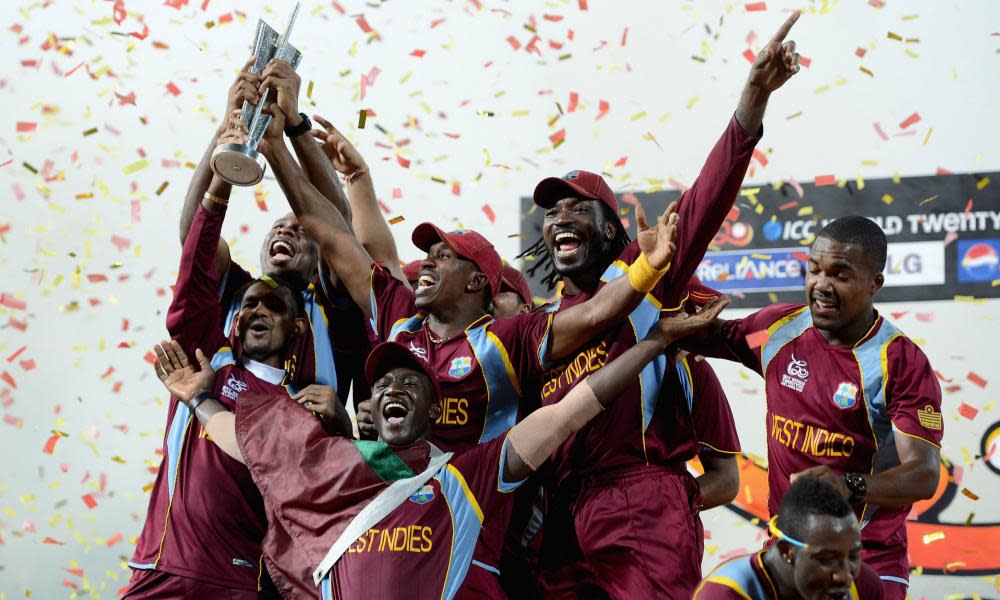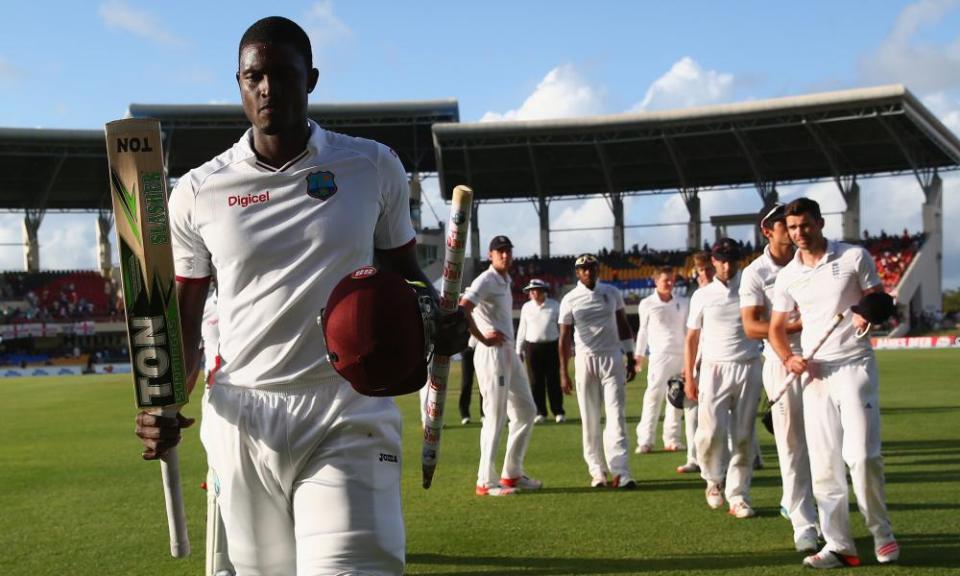West Indies cricket aims to be more inclusive as hopes grow for new dawn | Ali Martin

It is at the Coolidge Cricket Ground in Antigua, the former playground of the now disgraced and jailed financier, Allen Stanford, where something resembling a new dawn is occurring for cricket in the Caribbean.
Once the scene of the unedifying Twenty20 for $20m match in 2008 before running into disrepair, the refurbished ground is soon to become the home of the West Indies Cricket Board and on Tuesday evening England were visitors there once more. This time, thankfully, it was for a genteel drinks reception to toast the upcoming one-day series rather than as the playthings of a Texan billionaire.
Welcoming the tourists – among whom only their fielding coach, Paul Collingwood, played in the infamous 10-wicket defeat to the Stanford Superstars nine years ago – was the new chief executive of the WICB, Johnny Grave, who after nine years working for the Professional Cricketers’ Association in England is hoping to revive the cricketing landscape most affected by the Twenty20 revolution.
The 40-year-old is one of three fresh appointments looking to attempt this reboot, with the popular former West Indies Test batsman, Jimmy Adams, newly arrived as director of cricket after five years at Kent and the experienced Australian, Stuart Law, brought in as head coach of the senior men’s team. And for all the talk of decline in West Indies cricket, it must be remembered that talent-wise, the region remains verdant.
Both the men and women’s sides are the reigning World Twenty20 champions – the former are the only team to have won the crown twice – and a third title came in 2016 when their Under-19s sealed their 50-over World Cup. Since the introduction of the Professional Cricketers League in 2014 – a move by Adams’ predecessor, Richard Pybus – the sport is a more viable career than ever before too.
At first-class level the antiquated pay-as-you-play arrangement has been replaced by domestic annual retainers worth around £30,000 for multi-format players – above the average for the region – in a revamped structure that allows inter-island movement. There are 15 all-format national deals that top six figures, the Caribbean Premier League (the self-styled biggest party in sport) is further rewarding the region’s best Twenty20 cricketers, while women’s cricket, internationally at least, is now also professional.

Their problems, though, lie with the men’s Test and one-day international sides, where they have respective world rankings of No8 and No9 – the latter denying them a place in this summer’s Champions Trophy and now endangering automatic qualification for the 2019 World Cup. It is a result of a period where their highest profile players have, outside of tournaments, been largely pursuing short-form deals overseas worth far in excess of the central contracts they commonly reject.
Of the World Twenty20-winning side only Carlos Brathwaite – he of the four consecutive sixes off Ben Stokes in the final – will face England at the Sir Vivian Richards stadium on Friday, with national selection having been conditional to playing the relevant format domestically in the Caribbean since 2010 – a stance hardened up four years later by Pybus as part of his groundbreaking overhaul of the game to remove any flexibility.
This protectionist policy was designed to shore up the region’s tournaments given the Indian Premier League, Australia’s Big Bash and their Bangladesh and Pakistan equivalents all overlap with parts of the season. It has proved largely self-defeating, however, and now, albeit too late for its biggest casualty for the upcoming series, Marlon Samuels, it is being reconsidered by the new regime.

“Jimmy [Adams] is definitely reviewing it,” says Grave. “If we keep finding reasons for our players not to play for the West Indies, are we genuinely going to be putting the best 11 players out on the field? I think the answer to that is no. There has to be balance and compromise.
“What does the cricket fan in the region want? The best players in those three formats. We have to try and make it almost impossible for us to come into conflict with our players over scheduling.”
Conflict has certainly been a recent theme, and a common denominator in plenty of it has been Whycliffe “Dave” Cameron, the Jamaican businessman who on Saturday will be re-elected unopposed for a third two-year term as West Indies board president after seeing off attempts by Caricom in late 2015 to force regime change and finding no challengers from the regional boards in this year’s election.
The most high profile conflict came just moments after Brathwaite’s title-winning assault on Stokes at Kolkata, when the captain, Darren Sammy, followed lifting the World Twenty20 trophy by taking aim at the board for showing them “disrespect”. Chiefly this stemmed from a drop in remuneration that was brokered prior to the tournament with the West Indies Player Association, of which only one of the squad was a member.
Sammy, who has since been sacked, is joined on the outside by Dwayne Bravo and Kieron Pollard, with the two all-rounders never seemingly forgiven for the aborted tour of India in 2014 that similarly resulted from a breakdown in relations with the board. Even when they committed to that season’s domestic 50-over tournament after the chaos had cost them World Cup spots, they continued to be overlooked for the one-day team.
Their issues contributed to the demise of Law’s predecessor, Phil Simmons, who found himself suspended in September 2015 for publicly discussing “interference from outside” in selection. He was finally sacked a year on, despite his overseeing the World Twenty20 win (in which Bravo returned) in between, due to what the board described as “differences in culture and strategic approach”.
The Test batsman Darren Bravo is currently out in the cold for calling Cameron a “big idiot” on Twitter last year after the president publicly explained the downgrading of his central contract in clumsy fashion, while the spinner Sunil Narine is unwilling to play for Trinidad and Tobago – and is thus ineligible for international cricket – due to a leaked email allegedly sent by the local board’s president that appeared to accuse him of “pelting” (chucking).
Unsurprisingly, Grave now wants to call an end to the public airing of differences by both players and administrators – “If everyone talks out of turn, it becomes the Wild West” – and, on the issue of those who pursue Twenty20 instead of international cricket, to begin accepting their individual career choices publicly even if there is private disappointment.

The lure of Twenty20 leagues is not restricted to just established internationals, however, with the case of Nicolas Pooran, a 21-year-old Trinidadian wicketkeeper-batsman, a recent such example.
This slight but six-hitting left-hander, who was described by AB de Villiers as “a special talent that needs looking after” when the pair were Carribean Premier League team-mates, is currently indefinitely suspended from all domestic cricket after opting out of playing for the Leeward Islands last November in order to take up a deal in the Bangladesh Premier League.
Whether Pooran’s move was wise is up for debate but the heavy-handed response did little to embrace a stray sheep. And sure enough, the Mumbai Indians signed him for £35,000 last week in what is a golden opportunity for a young cricketer who knows how short a sportsman’s career can potentially be having battled back from serious injuries to both legs in a car crash two years ago.
“These guys do want to play for West Indies,” says Eddie Tolchard, whose London-based agency, Insignia Sports, manages the careers of big beasts like Pollard, Sammy and Narine, as well as new-breed cricketers such as Pooran. “I think central, white-ball contracts could and would help some players but that’s not my call. I also appreciate there are budget and costs to work within and it wouldn’t be straightforward if it was considered. A large part would come down to rebuilding trust and some compromise from everyone.”
For most of last year’s World Twenty20 winners, too much water has likely already passed under the bridge. But Grave and Adams, who accept the global T20 leagues are not going away, are now actively exploring ways to keep the next generation in the West Indies fold for longer, including better scheduling, more time dedicated to career guidance and possibly splitting central contracts by formats.

“The outstanding issue now is player-eligibility,” said Adams in an interview published by ESPNCricinfo on Tuesday. “I’m encouraged by the fact that most, if not all parties are in agreement that what is in place now is not sustainable and might not be helping our cricket in the short or long term.
“I’m pretty realistic about where we’re at. Our standards aren’t good enough across the board and it’s reflected in the cricket that we play. But we have the raw materials; we have good young players. What we need is a system that can take this raw talent and convert it into an international product that’s world class.”
With the words from the new administrators more conciliatory than has previously been the case, there is now some hope that a stormy period for player relations in the Caribbean may yet be met by some clearer skies.
You hav been failing 4 d last 4yrs. Y don't u resign and FYI I've neva been given an A contract. Big idiot @davec51
— Darren Lil B46 Bravo (@DMBravo46) November 11, 2016

 Yahoo News
Yahoo News 
